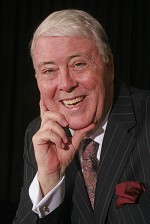Column Name
Title
Growing up in New York City, voice faculty member Robert White (M.M. ’68, voice) became enthralled with singing at an early age, perhaps not surprisingly given that his father, a renowned singer and radio personality in the 1920s and ’30s, was his first teacher. (“He emphasized diction, long legato lines, and great breath control.”) Young Robert himself sang on NBC and CBS radio, where he performed with such stars of his childhood as Bing Crosby, Frank Sinatra, and Fred Allen. White attended Hunter College and earned his master’s at Juilliard, where he studied with Beverley Johnson. With dozens of recordings and countless performances to his name, he has taught at Juilliard since 1991 and was the recipient of the William Schuman Scholar’s Chair in 2008. He is currently on the voice faculty of CUNY’s doctoral program and also taught at Manhattan School of Music for 10 years. On May 9, he will be the honoree at the annual Young Concert Artists benefit gala in Alice Tully Hall.
Body
When did you first know you wanted to be a musician?
By age 5, in 1943. At a block party for the war effort, I sang “White Cliffs of Dover” and the crowd went wild. They passed the hat, and I got this mountain ($26 worth) of coins. With it I bought my first bicycle, a balloon-tired Schwinn!
What was the first recording that you remember?
A V-Disc [records designed to boost morale during WWII] my late brother Joseph brought home from the Navy in 1945. Leopold Stokowski led the Philadelphia Orchestra in a lush orchestral arrangement of the Solo Violin Partita in E of Bach. I was mesmerized. To this day, I can hear every note of that piece in my head as if I were a violinist performing it live! From then on, I was electrified by classical music of all kinds, whether it be for solo voice, orchestra, chorus, solo instrument with orchestra. It all blew me away, and still does to this day.
What’s the most embarrassing moment you’ve had as a performer?
At a Mostly Mozart performance at Lincoln Center in the 1960s. I was the Impresario in Mozart’s Der Schauspieldirektor. Rita Shane had just sung her Madame Herz aria superbly, and I came right in with my next spoken dialogue when suddenly, my mind went entirely b-l-a-n-k! I started to speak gibberish on stage to Rita and finally, in desperation, though still in character, I blurted out, “So, my dear grande diva, what do you think I should donow?” Rita, great trouper that she was, answered (with a big smile that read, ‘dumb-dumb’), “Why don’t you ask Mademoiselle Silberklang tosiiiinnnng?! which of course was exactly what the script called for, and I was saved. But OMG, the embarrassment!
If you could have your students visit any place in the world, where would it be?
Paris, Munich, and Rome. I would tell them to find a little pension in each city, to try to spend at least a month or two in each town, speaking virtuallyno English the whole time, but to do their utmost to communicate in French or German or Italian with the natives. It will do wonders toward helping them learn and perform all the lieder and opera roles they’ll encounter as their careers grow.
What are your nonmusic related interests or hobbies?
I don’t really have any hobby to speak of, but it should be obvious from my previous answer that I love languages! I’m exceedingly comfortable in French, Italian, Spanish, German, and even Greek. Also, I’m a good cook and enjoy hosting dinner parties at my apartment.
What would people be surprised to know about you?
That I met the legendary violinist Fritz Kreisler—twice—when I was a teenager. He was well on in years, but perfectly charming. And also that I acted on the radio as a kid with another legend, Humphrey Bogart playing Cub Scout to my scoutmaster.
What do you want your students to remember from your teaching?
First, the supreme importance of being passionate about their music and their art. Also that good singing is not a study in muscular “push” and tight-throated swallowed sound—ever! Just last month at the voice department auditions, I was asked my secret for keeping my voice young and operational right up to this day. Here it is: I have never considered the pushing or forcing of the larynx to be an option in good singing. A voice can sound as big or as soft as needed through freely produced resonance rather than artificially induced strain.
What is your favorite thing about New York City?
New York City itself! It’s a totally magical place that provides any and all of us, artist and artisan alike, with access to just about any experience, insight, cuisine, language, or thrilling surprise we could ever hope to encounter.
What book are you reading and what CD are you listening to?
I’m rereading The Brothers Karamazov, which I first read at the age of 12. At that tender age, Ivan’s parable, “The Grand Inquisitor,” blew my mind and freed me—for life—from any and all superstition. I’m reading it again now, in my 75th year, to see what else Dostoevsky might teach me. I’ve been listening to CDs of two glorious singers, Birgit Nilsson and Franco Corelli.
If you weren’t in the career you are in, what would you be doing?
I would be either in advertising on Madison Avenue, or creating books and cartoons (if I could only draw!) on humor.
Who’s your favorite composer?
The easy answer is that I am passionately fond of Monteverdi, Berlioz, Saint-Saëns, Bach, Irving Berlin, Richard Rodgers, Purcell, Puccini, Verdi, Wagner, Mozart, Brahms, Poulenc, Liebermann, Corigliano, Bolcom, Musto, Beethoven, Von Weber, Britten, Stravinsky, Bartok, Barber—and on and on and on.





